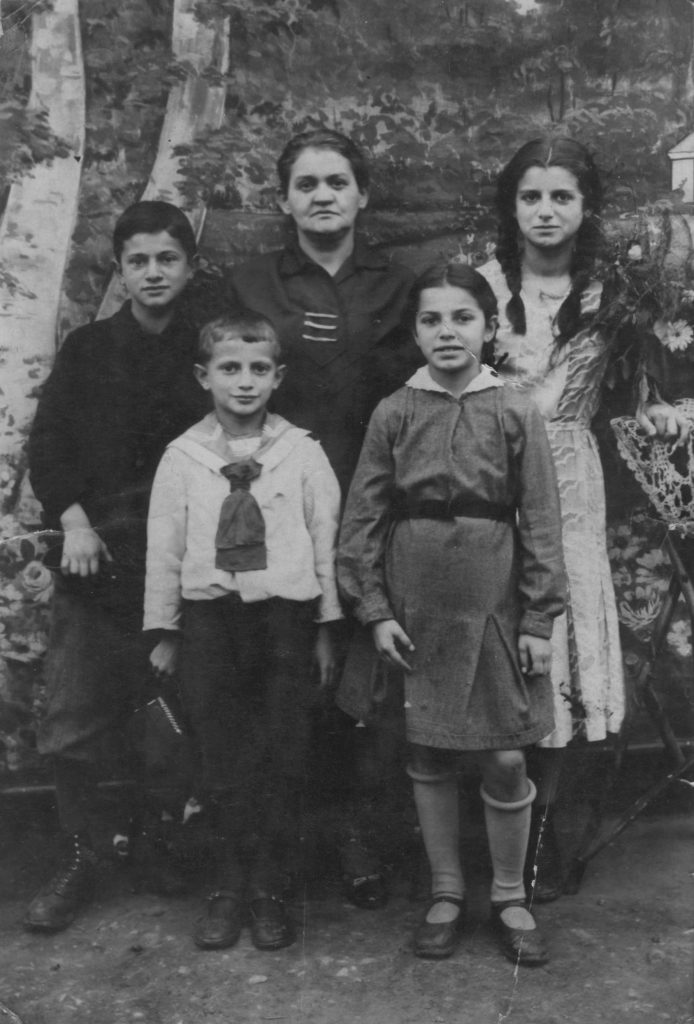Son of a Holocaust survivor shares his mother's harrowing story on March 13

Felicia Lewkowicz, front right, stands with her family before they were exterminated by the Nazis. Photo courtesy of the Holocaust Center for Humanity.
On March 13, Clark College hosts Matthew Erlich of the Holocaust Center for Humanity as he describes the journey of his mother, an Auschwitz survivor.
The event, which is free and open to the public, will take place at 1:00 p.m. in Gaiser Student Center on Clark’s main campus, located at 1933 Ft. Vancouver Way. For maps and directions, visit www.clark.edu/maps.
Matthew’s presentation begins with a slide of Felicia as a young girl surrounded by her large family. One at a time her sisters, brothers, and parents disappear, leaving only Felicia and one sister and connecting her family to the stories of millions during the Holocaust.
Felicia Lewkowicz was born in Krakow, Poland in 1923. In March 3, 1941, the Nazis established the Krakow ghetto and Jews were required to wear armbands.
Felicia and one brother were sent by the Nazis to the Krakow ghetto while her mother and other siblings were sent to Tarnow, 70 miles away. Conditions in the ghetto were terrible, with very little food. Illness and disease ranrampant. Luckily, Felicia was able to get work outside the ghetto, cleaning the offices of German officers. One day she did not return to the ghetto, escaping to a train that took her to Vienna, Austria. On the way, she stopped in Tarnow where she saw her family for the last time.
Erlich’s story travels with Felicia through her experiences during the Holocaust and ultimately to the United States, where she and her husband, also a Holocaust survivor, raised four sons.
“People need to see where hatred leads,” Erlich says. “Especially today with the rise of neo-Nazi groups, Holocaust deniers, and those who would attack others for their differences. My mother’s Holocaust experience shows what can happen – and offers ways to fight against it.”
This event is organized and sponsored by the Associated Students of Clark College. For more information, visit http://bit.ly/2thpmS5.
If you need accommodation due to a disability in order to fully participate in this event, contact Clark College’s Disability Support Services Office at 360-992-2314 or 360-991-0901 (VP), or visit Gaiser Hall room 137, as soon as possible.
About Clark College
Located in Vancouver’s Central Park and serving more than 12,000 students per quarter, Clark College is Southwest Washington’s oldest public institution of higher education. The college currently offers classes at two satellite locations: one on the Washington State University Vancouver campus and one in the Columbia Tech Center in East Vancouver. Additionally, its Economic & Community Development program is housed in the Columbia Bank building in downtown Vancouver.
About the Holocaust Center for Humanity
Connecting lessons of the Holocaust to a broad range of relevant themes for our time, from injustice and bullying to discrimination, the Holocaust Center for Humanity has been teaching students to become engaged citizens and to speak out against bigotry and prejudice since 1989. The Center works directly with teachers, students, and community groups across the Northwest to provide educational materials, curriculum,
and interaction with local Holocaust survivors who tell their stories to 20,000 students of all ages each year. In 2015, the Center opened its museum to the public. 15,000 students of all ages tour the Center’s exhibits during a school year.












